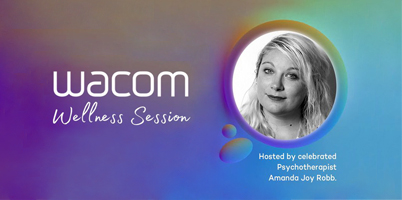I am sure you have all heard the term ‘covid burnout’ circulating the past few months. With so much uncertainty in the world, alongside the isolation most of us are facing, it is more important than ever to charge your toolbelt with strategies and tips for self care.
Working in a creative industry it is imperative to look after your headspace, to be able to be innovative and produce high quality work. As creative brilliance cannot come from an overworked, highly strung mind. We need to keep that tank charged, so we don’t lose our sparkle.
We have heard many personal stories from friends and colleagues in the industry who are struggling with the monotony that seems to be life at the moment, and at Wacom Australia HQ, we wanted to help. With the support of the fantastically brilliant Psychotherapist, Amanda Joy Robb, we hosted a free session, open to the public that addressed just this. This session explored a lot of physiological content and just oozed calming good vibes.
View this post on Instagram
We have highlighted the key take outs from the session below as an easy reference point, for anyone that needs it. Enjoy!
TOPIC 1: Feeling Overwhelmed & Uninspired
Monotonous routines, uncertainty and simply not having freedom to access your friends and family, brings with it brand new feelings and emotions. Lots of people have mentioned that their day starts at 11am, after they hear from Gladys. With no resolution or positive news being heard, feelings of anxiety, fear and uncertainty can start to snowball.
As Amanda so clearly told us in the Wacom session. The statement we need to tell ourselves is “It’s not what’s wrong with you, it’s what’s happening to you” – you are responding normally to an abnormal experience.
A tactic that Amanda explained, it’s what you do, in between what you do that matters most. This way of thinking is called your ‘third space’. A theory developed by peak performance researcher, Doctor Adam Fraser talks about moments of transition between one role and the next. That gap in the middle. We need to set intentional activity to ensure we have good boundaries around work and rest. What were we doing in our third space, pre-covid, that we are not doing now?
Think about this… when commuting to work each day, what would you enjoy doing? Listening to a podcast? Calling a friend? Internet shopping? These little activities make a huge difference to your mental health and without them, we blur the lines between work and rest and can burnout. When we enforce the third space, we give ourselves the opportunity to foster creativity and inspiration.
The next tip Amanda gave us was to incorporate a term called the ‘Mental space of Flow’. Which is the state of mind when a person becomes fully immersed in an activity with an intentional practice. When we enter this state, it encourages innovative, creative thought and general satisfaction.
Amanda also touched on the importance of daydreaming and thinking of all our bucket list to-do’s for when that sweet, sweet freedom day finally arrives. We need to remember, this is all temporary, and eventually life will return to ‘normal’.
So, map out that road trip you’ve always dreamt of taking, start planning your wedding. When we cultivate inspiration we boost all those lovely chemicals and endorphins and general feel good vibes.
TOPIC 2: Establish Boundaries & Routines
The hardest boundaries to maintain are not with other people, they are with ourselves. Establish boundaries for yourself, in order to help you stay emotionally regulated and, as Amanda puts it, take you into your third space. You should ask yourself what you want to cultivate in your day and what you have a choice over. We are the master of our own routine and structure.
A neat little tip is to have structure in your day – allocate work hours, third space time, self care time and connective time with loved ones. If you are working from home, leave your workspace with purpose, when your day is completed. Ie. shutting the computer down, packing things away, clearing your work space.
It’s also a great reminder to check in on loved ones that might be isolated. We are physically isolated but don’t have to be socially isolated.
TOPIC 3: Eliminate / Mitigate Negative Thoughts
The brain was designed for flight or fight many many years ago. It is easy to think negatively. Negative thoughts are magnetic and can offset many more negative thoughts, meaning it’s super easy to spiral. As Amanda mentioned, Neuroplasticity shows us that we need to rewire our brains to combat this. When we catch ourselves thinking about a negative thought, mindfully bring yourself back and stop yourself from overlooking the positive.
Another way you can train your brain to rethink is through Cognitive Behavioural Strategy. This tells us to challenge our thoughts. When we are experiencing negative bias, take a breath and have a think about where the evidence is coming from, to tell you this thought comes from truth. Your thoughts are more powerful than your feelings and behaviours.
But at the end of the day, we need to be kind to ourselves. We are living through a pandemic and we need to tell ourselves “It’s not what’s wrong with you, it’s what’s happening to you”. If you are not feeling like a creative person at the moment, that is okay. How you talk to yourself will have major discourse for how you go about your day.
It’s important to remember that connection and meaning gives purpose… keep reaching out to your community and look out for each other.
You are doing the best you can. Be kind and accepting of yourself and others.
If this blog brings up feelings and emotions in you that you are finding hard, Lifeline is only a call away, on 13 11 14. They are available 24 hours a day.






